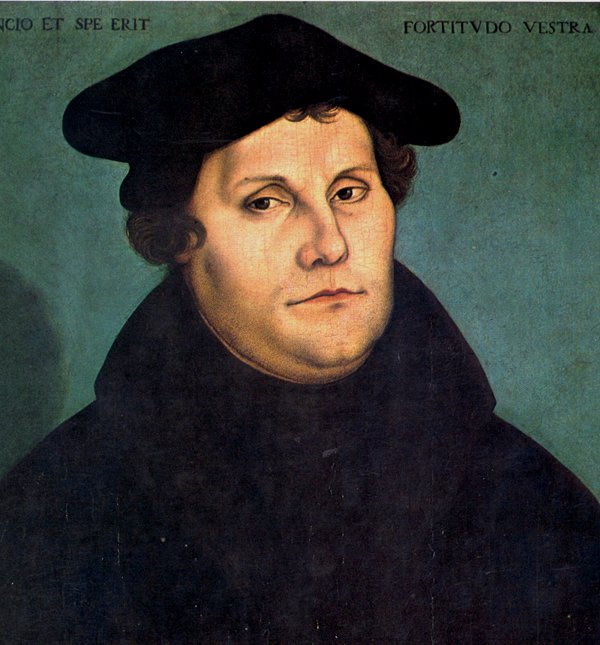Martin Luther Quotes
“The gospel cannot be truly preached without offense and tumult.”
Source: The Table Talk of Martin Luther
“Here I stand; I can do no otherwise. God help me. Amen!”
As reported in Dictionary of Burning Words of Brilliant Writers (1895) by Josiah Hotchkiss Gilbert, p. 186; and in Bartlett's Familiar Quotations, 10th ed. (1919)
Variant: Here I stand; I can do no other.
Source: Martin Luther's Ninety-Five Theses
Source: On the Bondage of the Will (1525), p. 270
Source: Dictionary of Burning Words of Brilliant Writers (1895), p. 278
Foreword to the small catechismus, as quoted in the Preface, The Book of Concord: The Confessions of the Evangelical Lutheran Church (2000) by Robert Kolb and Timothy J. Wengert, p. 19
Source: Temporal Authority: To What Extent It Should Be Obeyed (1523), p. 83
Source: On the Bondage of the Will (1525), p. 217
“Tell your master that if there were as many devils at Worms as tiles on its roofs, I would enter.”
Psalm. Ein feste Burg ist unser Gott (translated by Frederic H. Hedge), Reported in Bartlett's Familiar Quotations, 10th ed. (1919). "On the 16th of April, 1521, Luther entered the imperial city [of Worms]... On his approach… the Elector's chancellor entreated him, in the name of his master, not to enter a town where his death was decided. The answer which Luther returned was simply this". Bunsen, Life of Luther
Sermon on The Gospel for the Festival of the Epiphany, 1522.
Luther's Works, American Ed., Hans J. Hillerbrand, Helmut T. Lehmann eds., Philadelphia, Concordia Publishing House/Fortress Press, 1974, ISBN 0800603524 (Sermons II), vol. 52:198
“Holy Christendom has, in my judgment, no better teacher after the apostles than St. Augustine.”
http://books.google.com/books?id=3sq6RaxZt3cC&pg=PA107&dq=%22no+better+teacher+after+the+apostles+than+st.+augustine%22&lr=&sig=r-kmHoDO6R6wwIs7krbtAS7Jv7E
Luther's Works, American Ed., Robert H. Fischer, Helmut T. Lehman, eds., Concordia Publishing House/Fortress Press, 1959, ISBN 0800603370 (Word and Sacrament III), vol. 37:107
Source: Commentary on the Epistle to the Galatians (1535), Chapter 2
The Great Catechism. Second Command (1529)
Source: The Freedom of a Christian (1520), pp. 74-75
Source: Dictionary of Burning Words of Brilliant Writers (1895), p. 221
Source: The Freedom of a Christian (1520), p. 75
"On Infant Baptism," Large Catechism (1529)
Source: The Freedom of a Christian (1520), p. 69
Source: Commentary on the Epistle to the Galatians (1535), Chapter 2
Source: Commentary on the Epistle to the Galatians (1535), Chapter 2, Verse 6
D. Martin Luthers Werke, Kritische Gesamtausgabe, 61 vols., (Weimar: Verlag Hermann Böhlaus Nochfolger, 1883-1983), 52:39 [hereinafter: WA] 1544
Statement in defense of his writings at the Diet of Worms (19 April 1521), as translated in The Nature of Protestantism (1963) by Karl Heim, p. 78 Luther is often said to have declared, "Here I stand, I can do no other," before concluding with "God help me. Amen." However, there is no indication in the transcripts of the Diet or in eyewitness accounts that he ever said this. See "Disputed" section below.
The Precious and Sacred Writings of Martin Luther (1905) edited by John Nicholas Lenker; republished as Sermons of Martin Luther (1996), p. 291
1532
Denifle, Heinrich, Luther and Lutherdom http://www.archive.org/details/cu31924029249567, vol.1, part 1, tr. from 2nd rev. ed. of German by Raymund Volz, Somerset, England: Torch Press, 1917, (Cornell University Library 2009), ISBN 1112168176 ISBN 9781112168178, p. 305. Denifle cites Luther’s Sämtliche Werke (Vols 4-6 in 1), Erlangen-Frankfurt edition, 1865, Heyder & Zimmer, vol. vi, p. 401 http://books.google.com/books?id=zTMoAAAAYAAJ&pg=RA3-PA401&dq=%22und+fluchen+wie+die+Landsknecht%22&lr=#v=onepage&q=%22und%20fluchen%20wie%20die%20Landsknecht%22&f=false
Source: Temporal Authority: To What Extent It Should Be Obeyed (1523), p. 91
letter to the German rulers (1524), as quoted in The History of Compulsory Education in New England, John William Perrin, 1896
Source: Dictionary of Burning Words of Brilliant Writers (1895), p. 220
“The veneration of Mary is inscribed in the very depths of the human heart.”
Weimar edition of Martin Luther's Works (Translation by William J. Cole) 10, III, p. 313
Weimar edition of Martin Luther's Works, English translation edited by J. Pelikan [Concordia: St. Louis], Vol. 4, 694
On Justification CCXCIV
Table Talk (1569)
“Since the law is good, the will, which is hostile to it, cannot be good.”
Thesis 87
Disputation against Scholastic Theology (1517)
Source: The Freedom of a Christian (1520), pp. 73-74
Source: On the Bondage of the Will (1525), p. 313-314
Source: On the Bondage of the Will (1525), p. 241, 253
On War against the Turk (1529)
Source: On the Bondage of the Will (1525), p. 202
Source: Commentary on the Epistle to the Galatians (1535), Chapter 2, Verse 19
Martin Luther as quoted in Tappert, Theodore G. (1959). The Book of Concord: the Confessions of the Evangelical Lutheran Church. Philadelphia: Fortress Press, p. 595
863
Table Talk (1569)
Weimar edition of Martin Luther's Works, English translation edited by J. Pelikan [Concordia: St. Louis], Vol. 11, Vol. 24, 107
